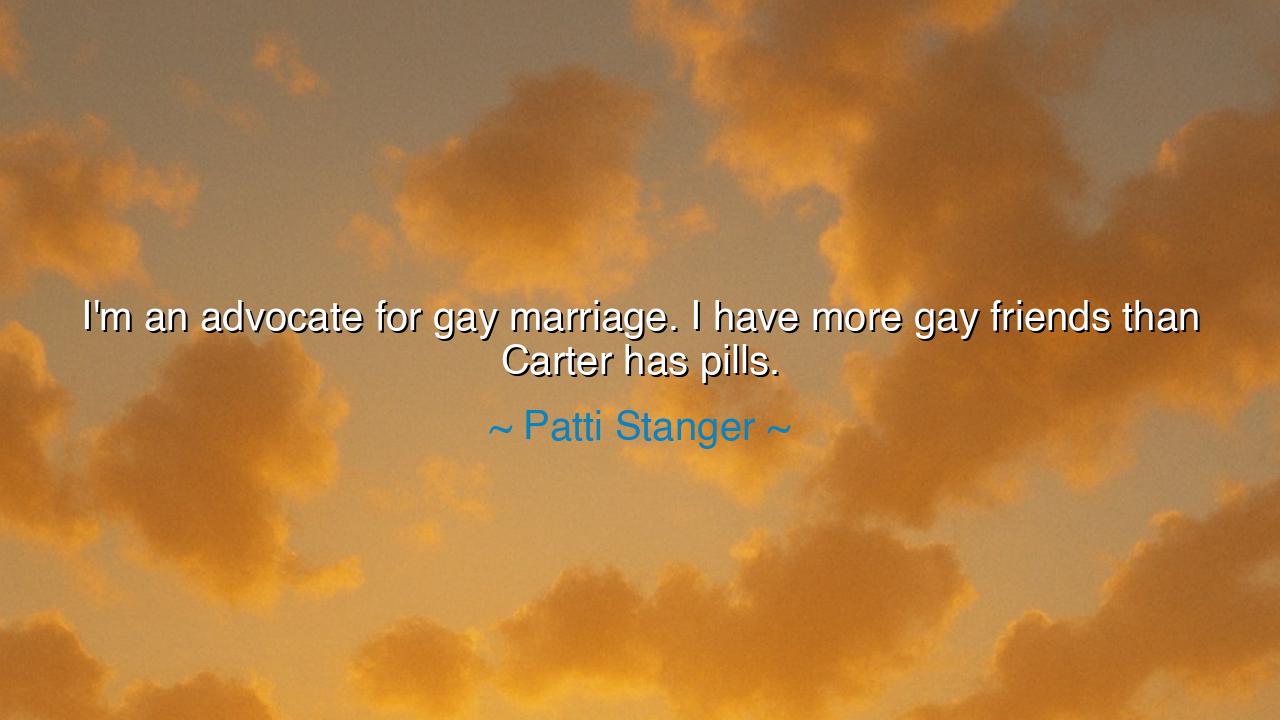
I'm an advocate for gay marriage. I have more gay friends than






In the lively yet earnest words of Patti Stanger, we find a truth wrapped in humor and affection: “I’m an advocate for gay marriage. I have more gay friends than Carter has pills.” Though spoken with wit, the heart beneath these words beats with conviction. It is the voice of someone who speaks not from politics or doctrine, but from relationship—from knowing, from loving, from living alongside others without prejudice. Through her playful exaggeration, Stanger declares her loyalty to a principle as ancient as justice itself: that love, in all its forms, is sacred and deserves recognition and equality. Her jest is a lantern lighting the deeper truth—that compassion and understanding are born not from distance, but from closeness.
The meaning of this quote lies in its union of advocacy and empathy. Patti Stanger is not making a distant declaration about law or policy; she is bearing witness to her life among friends, to her personal world shaped by love unbounded by convention. To say, “I have more gay friends than Carter has pills,” is to affirm, in the language of humor, the depth of her connection to people society has too often marginalized. Her defense of gay marriage flows naturally from that intimacy. For when you break bread with another, when you share laughter, sorrow, and humanity, you can no longer tolerate injustice against them. Equality ceases to be an abstract principle—it becomes a moral necessity, a reflection of friendship itself.
This truth, though wrapped in modern speech, has its origin in the oldest wisdom of humankind. From the dawn of civilization, sages and prophets have taught that we must love our neighbor as ourselves. Yet through centuries, humanity has struggled to extend that love beyond the familiar. The philosopher Socrates once said that true knowledge begins with recognition—seeing others not as “they,” but as “we.” Patti’s words, though light, embody that recognition. Her advocacy springs from fellowship, her defense from affection. She reminds us that equality grows not from argument, but from connection. When the heart opens to another’s truth, prejudice dissolves like mist before the rising sun.
History offers us many examples of how companionship can transform conscience. Consider Eleanor Roosevelt, who in her time became a champion of civil rights, women’s rights, and later, the dignity of all people. Her compassion was not born in privilege, but in her friendships—with activists, with the oppressed, with those who had been silenced. It was through those relationships that she saw humanity without division. In the same way, Stanger’s laughter carries the weight of solidarity. She stands among her friends, not above them, declaring with warmth and wit that their love deserves the same blessing as any other. Her humor becomes a vessel for truth—proof that even light words can carry heavy wisdom.
Her quote also reveals the power of allyship—the act of standing beside those who fight for their rightful place in society. True allies do not speak for others; they amplify their voices. By publicly aligning herself with the cause of gay marriage, Stanger transforms friendship into action. She demonstrates that those who enjoy freedom have a sacred duty to extend it to others. The ancients would call this the ethic of kinship, the understanding that we are all threads in one great tapestry. When one thread is torn, the whole cloth weakens. Thus, the freedom of one group cannot be fully enjoyed while another remains bound.
There is also courage in her words—the courage to speak love in a world that often rewards silence. To advocate openly for equality, especially in times when such causes meet resistance, is to stand in the lineage of all who have dared to speak truth before it was safe. Her wit disarms, but her conviction remains unshaken. This is the way of the wise: to teach through joy, to challenge through laughter, to build bridges where others would build walls. Her humor, far from trivializing the cause, makes it accessible, reminding us that the fight for love should never forget the spirit of love itself.
Therefore, O seeker of understanding, take this lesson to heart: friendship is the root of justice, and empathy the soil in which equality grows. Do not wait until you are called upon to defend another—walk beside them now, learn their joys and their wounds, and let that knowledge shape your conscience. Let your love speak boldly, whether through action or through laughter. For humor can soften the hardest heart, and affection can heal what fear divides.
So remember the wisdom hidden in Patti Stanger’s jest: that true advocacy is not born of duty, but of love. When you see others as part of your own circle of care, their fight becomes your own. Equality, then, is not charity—it is kinship. Speak for it, live by it, and celebrate it. For in doing so, you become part of that ancient and unending story: the story of humanity learning, at last, to love without condition and to honor every heart that dares to love in return.






AAdministratorAdministrator
Welcome, honored guests. Please leave a comment, we will respond soon